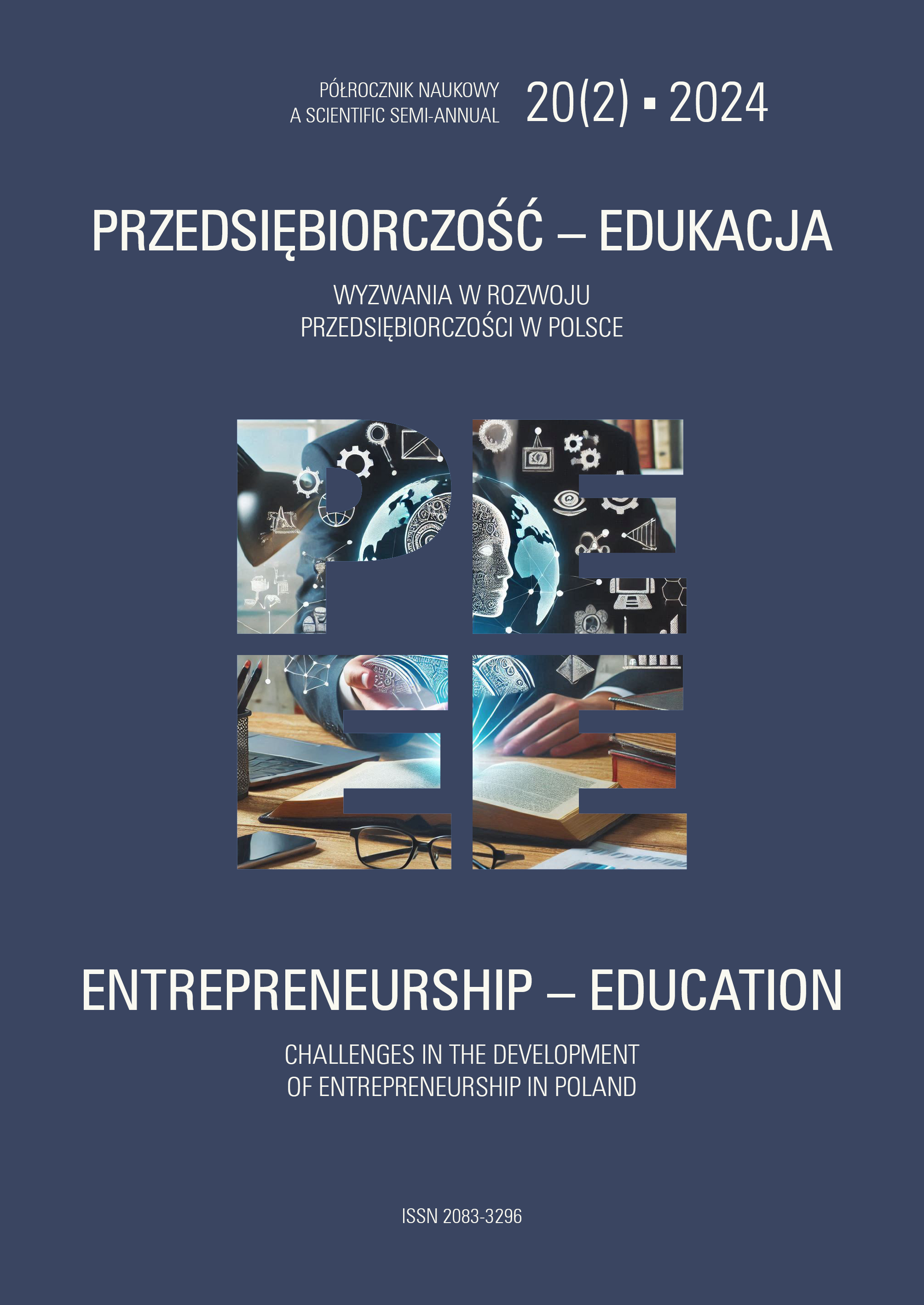Artificial Intelligence in Projects Co-Financed by EU Funds: a Case Study of the Beneficiaries of the Regional Operational Programme for the Małopolska Region (Poland)
DOI:
https://doi.org/10.24917/20833296.202.4Keywords:
European funds, Malopolska, enterpreneurship, Artificial intelligence, projectsAbstract
The authors of the article examine the impact of European funds on innovation by companies based in Krakow operating in the field of artificial intelligence (AI) technologies. The study is based on an analysis of selected enterprises benefiting from the Regional Operational Programme of the Małopolskie Voivodeship for the years 2014–2020. It focuses on understanding how financial support influences the development of innovation and market competitiveness. The results of the study show that European funds have a positive effect on the implementation of technological projects, increasing the innovative capacity of companies and enhancing their competitiveness both locally and internationally. The fund- ing enables enterprises to implement advanced technologies and develop new products. The analysis also highlights that financial support is particularly beneficial for small and medium-sized enterprises, providing them access to modern technologies. Collaboration between science and business, facilitated by the funds, contributes to the faster introduction of innovations to the market. The aim of the article is not to provide a detailed analysis of performance indicators before and after the implementation of inno- vations but rather to give an overall characterization of the projects and their impact on the technological development of the companies. The case study is limited to the context of Krakow, and its findings cannot be directly generalized to the entire Małopolskie Voivodeship. Conducting further research that includes other locations in the region would provide a more comprehensive picture of the impact of European funds on the development of AI technologies in Małopolska.
References
Baruk, J. (2022). Research and Development Expenditures in the Sector of Polish Enterprises as an Instrument of Research and Development Policy. Marketing of Scientific and Research Organizations, 43(1), 25‒52.
Borowski, P. (2011). Innowacje – przedsiębiorstwa XXI wieku. Europejski Doradca Samorządowy, 12(2), 8‒13.
Borrás, S. (2003). The Innovation Policy of the European Union. From Government to Governance.
Cheltenhamn ‒ Northampton: Edward Elgar.
Departament Skarbu i Gospodarki UMWM. (2016; 2024, 29 kwietnia). Program Strategiczny Regionalna Strategia Innowacji Województwa Małopolskiego. Pozyskano z: https://www.malopolska.pl/_us- erfiles/uploads/RG-X/Regionalna%20Strategia%20Innowacji%20Wojew%C3%B3dztwa%20 Ma%C5%82opolskiego%202020%20-%20aktualizacja%202018.pdf
González Fernández, S., Kubus, R., Pérez-Iñigo, J.M. (2019; 2024, 29 kwietnia). Innovation Ecosystems in the EU: Policy Evolution and Horizon Europe Proposal Case Study (the Actors’ Perspective). Sustainability, 11(17), 4735. DOI: https://doi.org/10.3390/su11174735.
Grzelak, M.M., Dworak, E. (2020). Innowacyjność polskiej gospodarki na tle krajów UE – wybrane aspekty teoretyczne i praktyczne. Łódź: Wydawnictwo Uniwersytetu Łódzkiego.
Kamiński, R. (2020). Istota innowacji ‒ definicje, wyznaczniki i rodzaje. W: R. Kamiński (red.), Innowacje gospodarcze. Wybrane aspekty ekonomiczne i prawne. Poznań: Wydawnictwo Naukowe UAM, 13‒24.
Kopaliński, W. (2007). Słownik wyrazów obcych i zwrotów obcojęzycznych z almanachem. Warszawa: Oficyna Wydawnicza Rytm.
Komisja Europejska. (2019; 2024, 23 kwietnia). A definition of AI: Main capabilities and scientific disciplines. Pozyskano z: https://digital-strategy.ec.europa.eu/en/library/definition-artificial-intelligence-main-capabilities-and-scientific-disciplines
Leijten, J. (2019; 2024, 29 kwietnia). Innovation policy and international relations: directions for EU di- plomacy. European Journal of Futures Research, 7, https://eujournalfuturesresearch.springeropen. com/articles/10.1186/s40309-019-0156-1
Moagar-Poladian, S., Folea, V., Păunică, M. (2017). Competitiveness of EU member states in attract- ing EU funding for research and innovation. Romanian Journal of Economic Forecasting 20(2), 150‒167.
Murzyn, D. (2017). Polityka spójności UE jako źródło finansowania działalności innowacyjnej przed- siębiorstw w Polsce. Prace Naukowe Uniwersytetu Ekonomicznego we Wrocławiu, 466, 157‒166.
OECD, Eurostat. (2018; 2024, 17 kwietnia). Podręcznik Oslo. Zasady gromadzenia i integracji danych dotyczących innowacji. Pomiar działalności naukowej i technicznej. Pozyskano z: http://home.agh. edu.pl/~kkulak/lib/exe/fetch.php?media=user:konrad:vary:oslo-manual.pdf
Pizło, W. (2009). Studium przypadku jako metoda badacza w naukach ekonomicznych. Stowarzyszenie Ekonomistów Rolnictwa i Agrobiznesu – Roczniki Naukowe, XI(5), 246‒251.
Polityka dla rozwoju sztucznej inteligencji w Polsce od roku 2020. Załącznik do uchwały nr 196 Rady Ministrów z dnia 28 grudnia 2020 (2020; 2024, 24 kwietnia). Pozyskano z: https://www.gov.pl/web/ ai/polityka-dla-rozwoju-sztucznej-inteligencji-w-polsce-od-roku-2020
Prabola, J. (2024, 29 kwietnia). NarrowBand IoT rewolucjonizuje internet rzeczy. Pozyskano z: https:// forbot.pl/blog/narrowband-iot-rewolucjonizuje-internet-rzeczy-id21330
Russell, S., Norvig, P. (2016). Artificial Intelligence: A Modern Approach. Pearson Education. Sezo (2024, 29 kwietnia). https://sezo.pl/lte-m-polska/
Skalfist, P., Mikeltsen, D., Teigens, V. (2020). Sztuczna inteligencja: czwarta rewolucja przemysłowa. Cambridge: Cambridge Stanford Books.
Solecki, R., Kobis, R. (2023). Wpływ funduszy europejskich na rozwój przedsiębiorczości – Rola Małopolskiego Centrum Przedsiębiorczości w wykorzystaniu funduszy europejskich w województwie małopolskim, Przedsiębiorczość – Edukacja [Entrepreneurship – Education], 19(2), 71‒86.
Siuta-Tokarska, B. (2021). Przemysł 4.0 i sztuczna inteligencja: szansa czy zagrożenie dla realizacji koncepcji zrównoważonego i trwałego rozwoju?. Nierówności Społeczne a Wzrost Gospodarczy, 65, 7‒26.
Szczegółowy Opis Osi Priorytetowych Regionalnego Programu Operacyjnego Województwa Małopolskiego na lata 2014‒2020 – SZOOP WM. (2024; 8 października). Pozyskano z: https:// www.rpo.malopolska.pl/download/program-regionalny/o-programie/zapoznaj-sie-z-prawem-i-dokumentami/szczegolowy_opisu_osi_priorytetowych_regionalnego_programu_operacyjne- go_wojewodztwa_malopolskiego/2024/02/SzOOP_20022024.pdf
Szuper, K., Wołoszyn, K. (2020). Innovation & enterprise innovation strategies. Scientific Papers of Silesian University of Technology – Organization and Management Series, 148, 735‒748.
Visegrad Patent Institute (2024; 30 kwietnia). https://vpi.int/pl/03-o-pct/
Downloads
Published
How to Cite
Issue
Section
License
Copyright (c) 2024 Entrepreneurship – Education

This work is licensed under a Creative Commons Attribution-NoDerivatives 4.0 International License.
Articles are published under the terms of the Creative Commons License (CC BY-ND 4.0; Attribution– NoDerivs).

